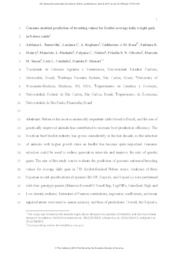Genome-enabled prediction of breeding values for feedlot average daily weight gain in nelore cattle.
Genome-enabled prediction of breeding values for feedlot average daily weight gain in nelore cattle.
Author(s): SOMAVILLA, A. L.; REGITANO, L. C. de A.; ROSA, G. J. M.; MOKRY, F. B.; MUDADU, M. de A.; TIZIOTO, P. C.; OLIVEIRA, P. S. N. de; SOUZA, M. M. de; COUTINHO, L. L.; MUNARI, D. P.
Summary: Nelore is the most economically important cattle breed in Brazil, and the use of genetically improved animals has contributed to increase beef production efficiency. The Brazilian beef feedlot industry has grown considerably in the last decade, so the selection of animals with higher growth rates on feedlot has become quite important. Genomic selection could be used to reduce generation intervals and improve the rate of genetic gains. The aim of this study was to evaluate the prediction of genomic estimated breeding values for average daily gain in 718 feedlot-finished Nelore steers. Analyses of three Bayesian model specifications (Bayesian GBLUP, BayesA, and BayesCπ) were performed with four genotype panels (Illumina BovineHD BeadChip, TagSNPs, GeneSeek High and Low-density indicus). Estimates of Pearson correlations, regression coefficients, and mean squared errors were used to assess accuracy and bias of predictions. Overall, the BayesCπ model resulted in less biased predictions. Accuracies ranged from 0.18 to 0.27, which are reasonable values given the heritability estimates (from 0.40 to 0.44) and sample size (568 animals in the training population). Furthermore, results from Bos taurus indicus panels were as informative as those from Illumina BovineHD, indicating that they could be used to implement genomic selection at lower costs.
Publication year: 2017
Types of publication: Journal article
Observation
Some of Embrapa's publications are published as ePub files. To read them, use or download one of the following free software options to your computer or mobile device. Android: Google Play Books; IOS: iBooks; Windows and Linux: Calibre.
Access other publications
Access the Agricultural Research Database (BDPA) to consult Embrapa's full library collection and records.
Visit Embrapa Bookstore to purchase books and other publications sold by Embrapa.

